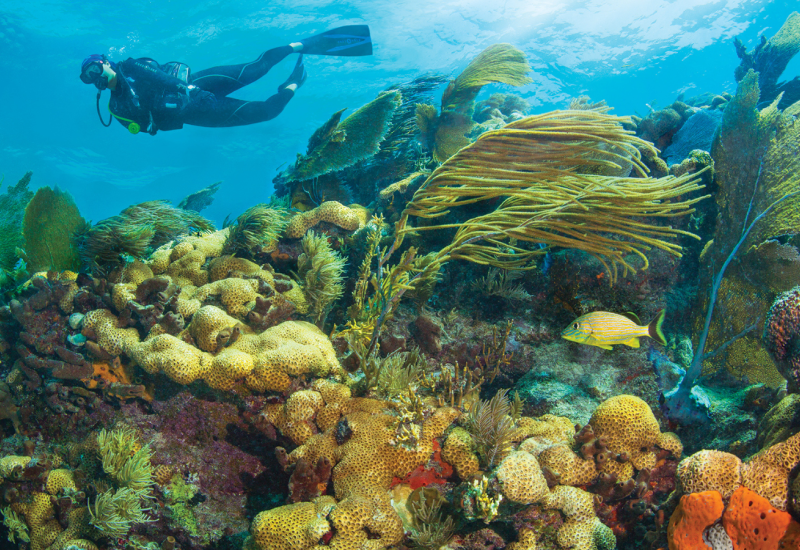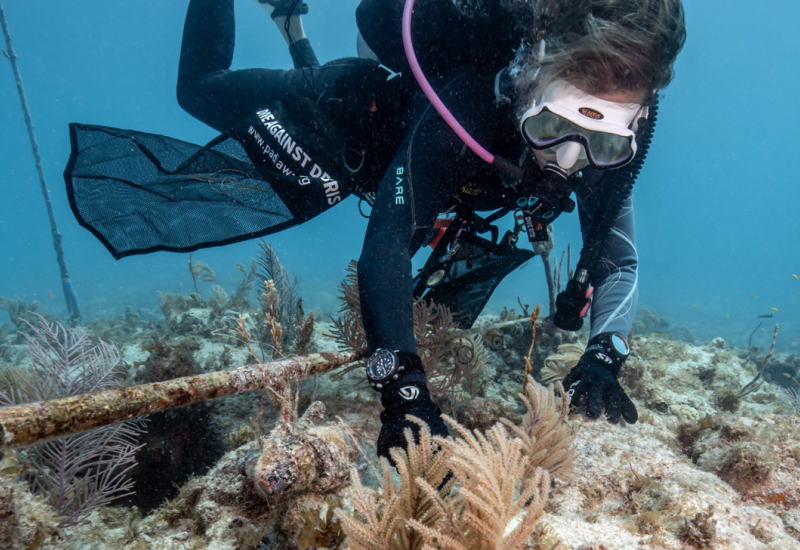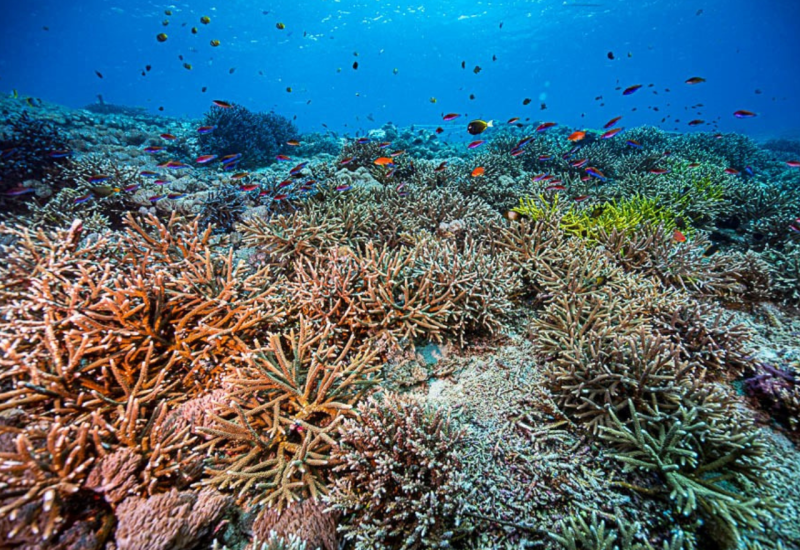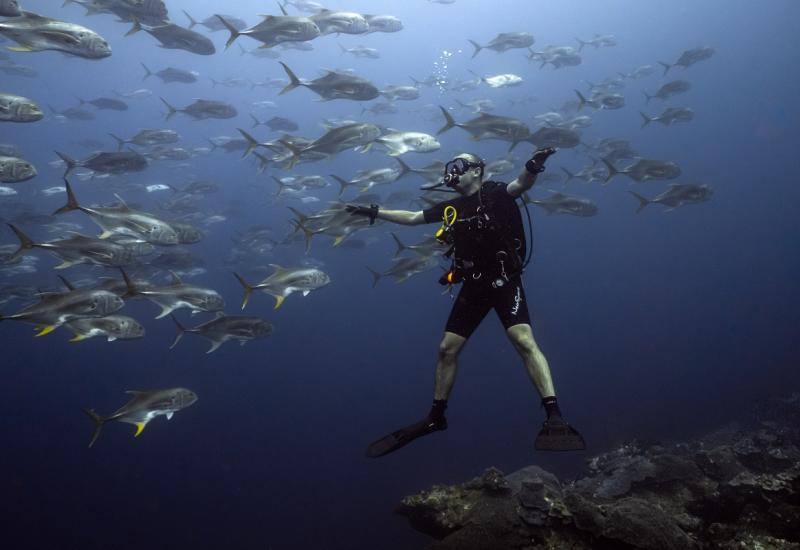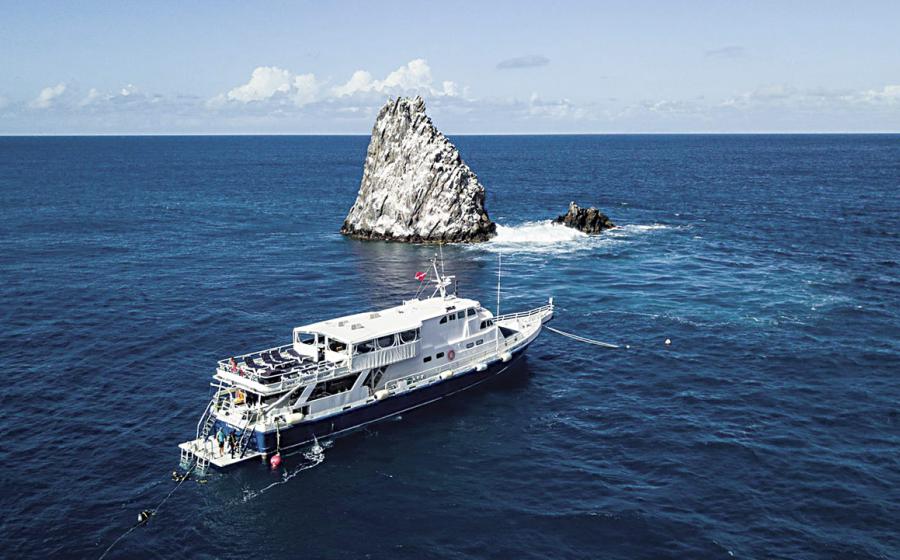Ask an Expert: Is Wearing Gloves Bad for the Reefs?

Ask an Expert: Is Wearing Gloves Bad for Reefs
Masa Ushioda
**Remove the problem, not the gloves. By Vallorie Hodges **
Vallorie Hodges is a dive-safety officer at Oregon State Aquarium. With more than 7,300 dives worldwide, she has also served on the board of the American Academy of Underwater Sciences.
The intent is to assure the safety of the reef by minimizing damage caused by divers; the strategy is to remove gloves. The intent is excellent, the strategy flawed.
Yes, divers damage reefs by accidentally or intentionally contacting them. They grab the reef to stabilize themselves, kick the reef or bottom and land on the reef or bump into it, all due to poor buoyancy, trim or finning skills. Sometimes they touch an organism intentionally — to satisfy a human desire to interact with it, to shift it to a better position to photograph, or simply to see it move. Removing gloves only partly addresses grabbing the reef to stabilize position.

Gloves are personal protective equipment. Removing them places that diver at risk of injury. I’ve seen divers incur lacerations and fire-coral stings. The risk of infection in such an injury might be high — and can become deadly. And this was just coral. It could easily have been dangerous marine life.
Divers frequently use ascent/descent/ anchor lines due to current and conditions. The remains of jellyfish are often found wrapped around such lines. Some are not dangerous, but deadly species are widely distributed around the world. Without gloves, divers can get stung and develop mild reactions, or worse.
I’ve also witnessed appalling injuries to divers returning to boat or shore, from tripping and falling against rocks to ripping hands on sharp edges of ladders to bare hands slipping due to lack of traction. A bare hand underwater is also very bright and can be mistaken for food or become a target for an aggressive fish. Again, even “inconsequential” injuries can become highly consequential — not to mention the expense of medical treatment or the loss of diving time on an expensive diving vacation.
And why gloves? Since just as much damage might be caused by fins and other body parts, why not require divers to dive without thermal protection or fins? That would be crazy, wouldn’t it?
A superior reef-protecting strategy is education. Teach, coach or even challenge divers to develop buoyancy and finning skills. Engage divers with a culture of “look but don’t touch,” and they, in turn, will reinforce this culture. Resort operators often provide service strategies to support divers who might need assistance developing these skills and attitudes: continuing education, naturalist briefings, thorough predive briefings, assessment of skills, dive-site selection and using quality dive guides.
The bottom line is divers should have the freedom to protect themselves from accidental injury. Gloves, like wetsuits, prevent potentially deadly injuries to a diver as well as minor injuries that might initially seem inconsequential.
As someone who values both the reef and the well-being of the diver, I see a great miscarriage of intent with a policy of removing divers’ gloves; it is but a bandage on a wound that needs a much larger dressing.
For the sake of our reefs, keep the gloves off. By Serge de Groote
Serge De Groote is dive operations manager at Divi Flamingo Resort and Casino on Bonaire. He was recently honored by Bonaire Hotel and Tourism Association for his many years of contribution to tourism on the island.
In areas where there are reefs, using gloves as a security blanket is unrealistic. Divers should avoid touching corals, sponges and any kind of marine life regardless of whether they’re wearing gloves. But by keeping gloves off, it only further ensures that they won’t touch the reef.
Ignore for the moment that touching a coral might break it; even by gently touching corals you take away their protective layer, allowing bacteria or other organisms to settle and put the corals in distress, and even start to kill them.
The solution to the problem lies in education: Teach divers to maintain neutral buoyancy! Even after divers are certified, all dive operators and dive pro- fessionals should keep working with their divers and assist them wherever they can to ensure that proper buoyancy is established. This isn’t always easy, but it’s the most effective way to conserve our reefs.
Thirteen years ago, I arrived in Bonaire after working in the Maldives, Cuba, Sri Lanka, Red Sea and other beautiful dive destinations. I was impressed with

Bonaire’s marine-park system and its regulations for reef conservation. Included in these marine-park regulations is a complete ban on use of gloves for both diving and snorkeling. The only exception to this rule is for disabled water-sport users and divers who have a written note from a physician explaining that the use of gloves is necessary due to their medical condition. For these marine-park users, a special permit is issued and approved by the marine park. These divers are closely monitored by dive staff and marine-park rangers to ensure that even though they are wearing gloves, they are not hanging onto the reef or handling marine life.
When wearing gloves, there is a perception of being completely protected from marine-life stings or bites. This is false security. Certain fish species and bottom dwellers have very hard, very venomous spines that would go straight through a glove anyway; this applies to bites from eels and other animals as well. A pair of gloves is not an impenetrable shield.
In situations where divers are diving along a reef in a heavy current, it’s still no excuse to wear gloves. Again, this is another situation in which divers should be educated about special procedures. Perfect your buoyancy, learn how to streamline and float in the current, and how to duck down behind obstructions, for example, if you need to stop.
There are other solutions, of course, such as reef hooks and fixed points where a diver can hang. These help to eliminate the need for gloves. To me, the only time gloves are an appropriate piece of gear for a diver is in waters where the temperature makes hypothermia a real threat; anywhere else, gloves just offer a false sense of security that ultimately harms the reef.
If you'd like to get in on the debate, give your opinion in the Comments section below.

Masa Ushioda
Remove the problem, not the gloves. By Vallorie Hodges
Vallorie Hodges is a dive-safety officer at Oregon State Aquarium. With more than 7,300 dives worldwide, she has also served on the board of the American Academy of Underwater Sciences.
The intent is to assure the safety of the reef by minimizing damage caused by divers; the strategy is to remove gloves. The intent is excellent, the strategy flawed.
Yes, divers damage reefs by accidentally or intentionally contacting them. They grab the reef to stabilize themselves, kick the reef or bottom and land on the reef or bump into it, all due to poor buoyancy, trim or finning skills. Sometimes they touch an organism intentionally — to satisfy a human desire to interact with it, to shift it to a better position to photograph, or simply to see it move. Removing gloves only partly addresses grabbing the reef to stabilize position.

Gloves are personal protective equipment. Removing them places that diver at risk of injury. I’ve seen divers incur lacerations and fire-coral stings. The risk of infection in such an injury might be high — and can become deadly. And this was just coral. It could easily have been dangerous marine life.
Divers frequently use ascent/descent/ anchor lines due to current and conditions. The remains of jellyfish are often found wrapped around such lines. Some are not dangerous, but deadly species are widely distributed around the world. Without gloves, divers can get stung and develop mild reactions, or worse.
I’ve also witnessed appalling injuries to divers returning to boat or shore, from tripping and falling against rocks to ripping hands on sharp edges of ladders to bare hands slipping due to lack of traction. A bare hand underwater is also very bright and can be mistaken for food or become a target for an aggressive fish. Again, even “inconsequential” injuries can become highly consequential — not to mention the expense of medical treatment or the loss of diving time on an expensive diving vacation.
And why gloves? Since just as much damage might be caused by fins and other body parts, why not require divers to dive without thermal protection or fins? That would be crazy, wouldn’t it?
A superior reef-protecting strategy is education. Teach, coach or even challenge divers to develop buoyancy and finning skills. Engage divers with a culture of “look but don’t touch,” and they, in turn, will reinforce this culture. Resort operators often provide service strategies to support divers who might need assistance developing these skills and attitudes: continuing education, naturalist briefings, thorough predive briefings, assessment of skills, dive-site selection and using quality dive guides.
The bottom line is divers should have the freedom to protect themselves from accidental injury. Gloves, like wetsuits, prevent potentially deadly injuries to a diver as well as minor injuries that might initially seem inconsequential.
As someone who values both the reef and the well-being of the diver, I see a great miscarriage of intent with a policy of removing divers’ gloves; it is but a bandage on a wound that needs a much larger dressing.
For the sake of our reefs, keep the gloves off. By Serge de Groote
Serge De Groote is dive operations manager at Divi Flamingo Resort and Casino on Bonaire. He was recently honored by Bonaire Hotel and Tourism Association for his many years of contribution to tourism on the island.
In areas where there are reefs, using gloves as a security blanket is unrealistic. Divers should avoid touching corals, sponges and any kind of marine life regardless of whether they’re wearing gloves. But by keeping gloves off, it only further ensures that they won’t touch the reef.
Ignore for the moment that touching a coral might break it; even by gently touching corals you take away their protective layer, allowing bacteria or other organisms to settle and put the corals in distress, and even start to kill them.
The solution to the problem lies in education: Teach divers to maintain neutral buoyancy! Even after divers are certified, all dive operators and dive pro- fessionals should keep working with their divers and assist them wherever they can to ensure that proper buoyancy is established. This isn’t always easy, but it’s the most effective way to conserve our reefs.
Thirteen years ago, I arrived in Bonaire after working in the Maldives, Cuba, Sri Lanka, Red Sea and other beautiful dive destinations. I was impressed with

Bonaire’s marine-park system and its regulations for reef conservation. Included in these marine-park regulations is a complete ban on use of gloves for both diving and snorkeling. The only exception to this rule is for disabled water-sport users and divers who have a written note from a physician explaining that the use of gloves is necessary due to their medical condition. For these marine-park users, a special permit is issued and approved by the marine park. These divers are closely monitored by dive staff and marine-park rangers to ensure that even though they are wearing gloves, they are not hanging onto the reef or handling marine life.
When wearing gloves, there is a perception of being completely protected from marine-life stings or bites. This is false security. Certain fish species and bottom dwellers have very hard, very venomous spines that would go straight through a glove anyway; this applies to bites from eels and other animals as well. A pair of gloves is not an impenetrable shield.
In situations where divers are diving along a reef in a heavy current, it’s still no excuse to wear gloves. Again, this is another situation in which divers should be educated about special procedures. Perfect your buoyancy, learn how to streamline and float in the current, and how to duck down behind obstructions, for example, if you need to stop.
There are other solutions, of course, such as reef hooks and fixed points where a diver can hang. These help to eliminate the need for gloves. To me, the only time gloves are an appropriate piece of gear for a diver is in waters where the temperature makes hypothermia a real threat; anywhere else, gloves just offer a false sense of security that ultimately harms the reef.
If you'd like to get in on the debate, give your opinion in the Comments section below.

